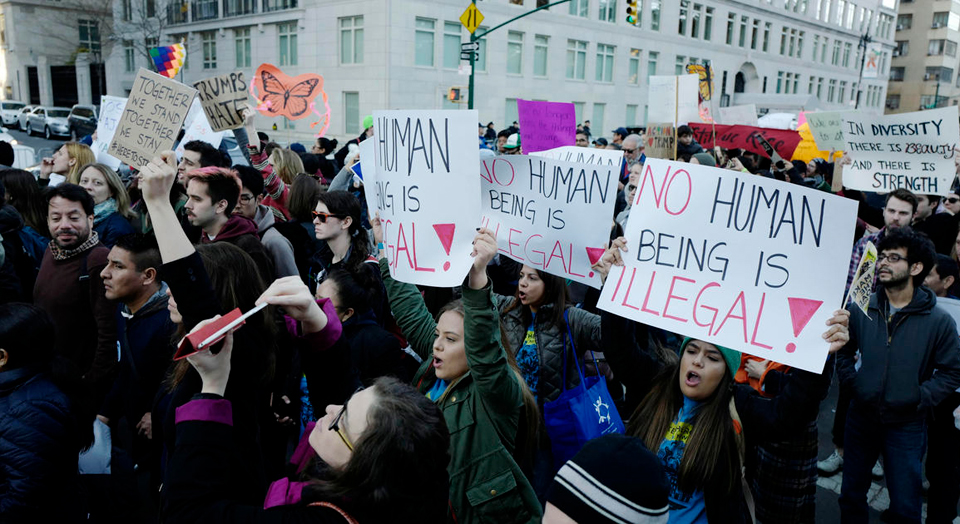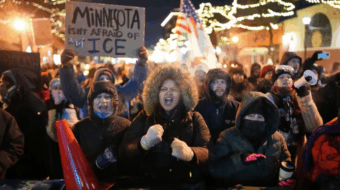
WASHINGTON—Again displaying hatred of immigrants in general and Latinos in particular, GOP President Donald Trump and his Attorney General, Jeff Sessions, struck out against 19 sanctuary cities, Cook County, Ill., and the states of California, Illinois and Oregon. They threatened to subpoena city, county and state instructions to police on how to treat undocumented people and cooperate — or not cooperate – with federal officials in rounding them up.
And if the cities, county and states, including New York, Los Angeles, Chicago, Philadelphia, Seattle, Denver, San Francisco, and Albany, N.Y., did not knuckle under, Sessions wrote, the administration would also yank their federal community policing money for fiscal 2017, which ended last Sept. 30, and demand they return money they got the year before. Each jurisdiction gets millions of dollars.
“Sanctuary cities are the best friends of gangs and cartels like MS-13,” Trump charged while meeting a group of mayors of the largest cities to talk about infrastructure. “They put illegal immigrants above law-abiding Americans.” Those statements carry on his campaign of hate against immigrants and Latinos, as MS-13 is a Latino gang.
Several of the cities and the American Civil Liberties Union hit back in defense of the undocumented people, and of their police forces, too. Latino groups had no immediate comment.
“They’re trying to demonize immigrants as part of their congressional strategy,” said New York Mayor Bill deBlasio, invited to the White House for the infrastructure meeting.
At least four mayors – himself, Chicago’s Rahm Emanuel, Eric Garcetti of Los Angeles and Mitch Landrieu of New Orleans – were so angry about Trump’s sanctuary cities demand, deBlasio said, that they boycotted the infrastructure session.
“The very day where we were told there would be a good-faith dialog, a bipartisan dialog on a crucial issue – infrastructure – that’s the day they decided to single out a group of American cities and, once again, threaten them,” deBlasio told New York reporters. His office posted a transcript of his remarks.
“This letter explicitly threatens our funding once again, threatens to subpoena our personnel on the very day where in principle they were telling us they wanted to have an honest dialog. This proves there was no intention to have an honest dialog.”
Emanuel agreed. He told a press conference during the U.S. Conference of Mayors meeting that federal courts back the cities and the immigrants, not Trump. He also said Trump’s issuance of the letter the same day showed “the emperor has no clothes” on other issues, such as infrastructure.
“The idea that you are also going to take leaders, mayors, and put them in legal and criminal jeopardy because there’s a disagreement — where in fact the courts already ruled both in our case and I think also the California case in San Francisco contrary to the Justice Department — it is really an amazing take for the Attorney General to disregard what the court system has already said uniformly from coast to coast,” Emanuel said.
Albany Mayor Kathy Sheehan told The PBS Newshour “we are in compliance with the laws.” She added – as other mayors have before her – that federal law governing the policing grants does not require local police to become or cooperate with Immigrations and Customs Enforcement officers. She was not part of the infrastructure meeting, but she, too, got a threatening letter from Sessions.
So did Cook County Board Chair Toni Preckwinkle, whose office said in a statement the county is already complying with applicable federal law, but would review Sessions’ request.
“In a city with a large proportion of immigrants and refugees, such enforcement “is not keeping our city safe” and discourages people from cooperating with the police, Sheehan added.
Trump’s “threats are lawless and baseless,” said ACLU immigrants’ rights project attorney Cody Wofsy. “Local officials commit no crime when they and their communities decide not to participate in deportations. They do not…harbor anyone from deportation by simply opting out. ICE can arrest people on its own — and in fact Congress gives the agency billions of dollars each year to do just that.”
“But local police are under no obligation to use their time and resources to help with arrest, detention, and deportation…. The point of sanctuary policies is non-participation, meaning if ICE wants to arrest and deport people it must do the work itself. There is nothing at all criminal about that, and it is irresponsible to suggest otherwise.”










